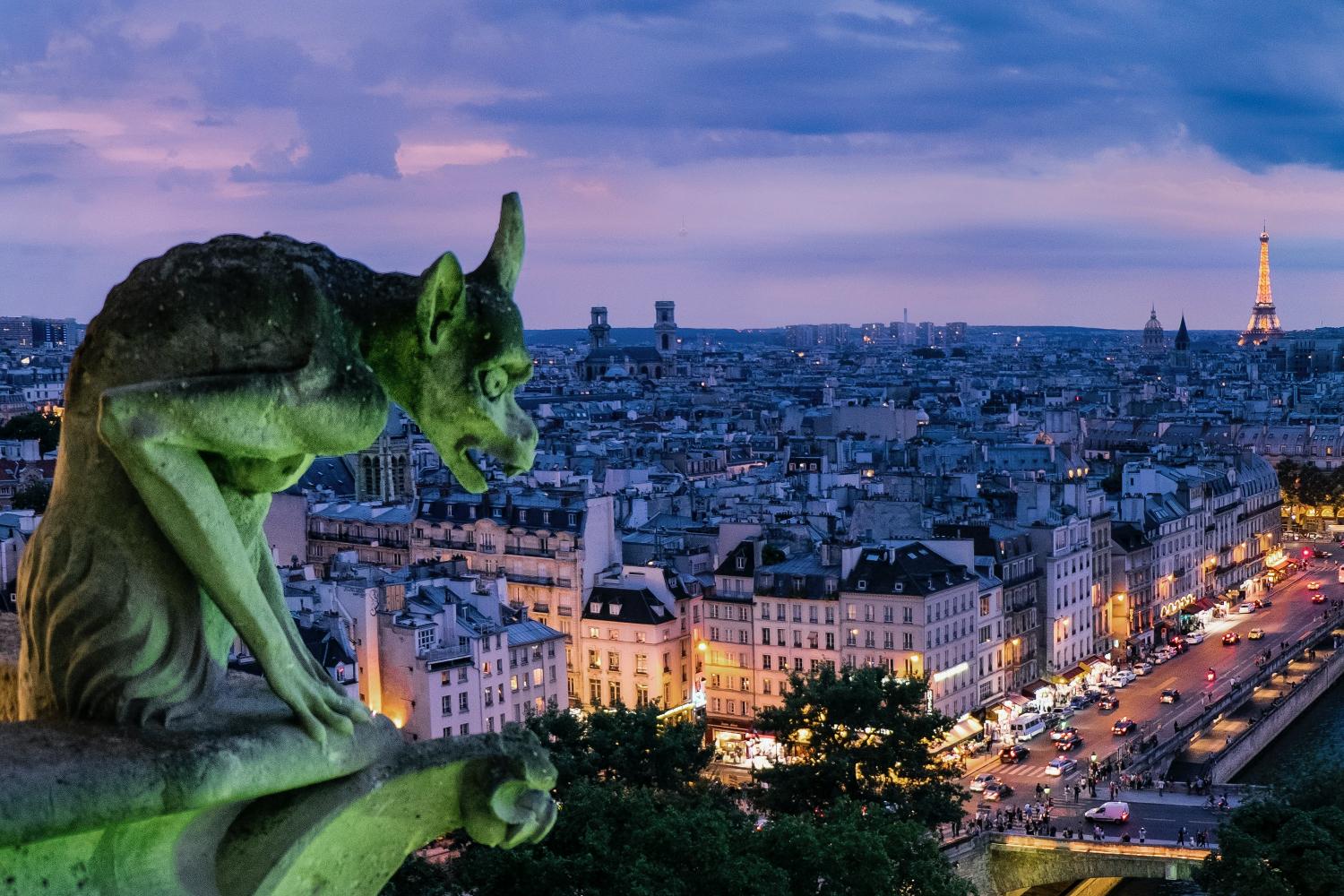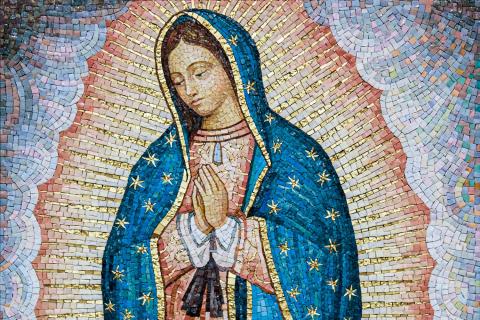
The following text is drawn from "Naming the New Lions: The Challenges of Contemporary Culture to Christian Faith," found in Renewal of Catholic Higher Education: Essays in Catholic Studies in Honor of Don J. Briel, published by the University of Mary in 2017. This article serves as the second in a series of four, beginning with "Naming the New Lions."
Perhaps the best way to understand relativism is to understand its aim, which, at least in its philosophical form, is to convince us that no human being, no human intelligence or spirit, can ever know or grasp ultimate truth in itself. It says to us: “What you think you know, or believe in, are merely appearances. Your conviction about God, for example, is a reflection, or a projection of your own, on a limited, human scale. In the end, all the words of faith you possess, all your convictions, represent, at best, only one way among others—and a very subjective way—of looking at reality.”
This voice of relativism, so apparently sane and humane, is heard today in many of the corridors of learning, in university forums and classrooms, for example, and in philosophical seminars and discussion groups. But its voice, its message, echoes in other places as well, many of them closer to home. It has found its way, for example, into the everyday world of books and films, kitchen-table talk and coffee-bar conversation, and also, and on more than a few occasions, I am sad to say, into Sunday homilies!
But why should we consider relativism a great or significant problem? The question arises because, at first glance, it doesn’t seem to be a threat comparable in any way to that of atheistic Communism at its height. Communism was not only a theory—it was also a social and political reality. It assumed a worldwide, visible form. In contrast, relativism is neither a political party nor a movement. It does have its public disciples, of course, but they tend to be academics. And so, one may well be tempted to dismiss the whole thing as a mere fad of certain intellectuals, and not therefore as a real threat. But, in fact, relativism has already made an enormous impact, not only on society in general but also on the life of the Church herself. In the United States a huge number of the faithful have abandoned the Church in recent years, choosing to live, whether with full consciousness or not, under the tenets of moral and spiritual relativism.
Relativism, I suspect, will emerge in the long run as a much more deadly threat to Catholic faith, and to human culture, than any past or present threat of Communism. Like almost nothing else I can think of, it draws away the lifeblood of strong religious conviction. Attempting, however, to confront it as a community of believers is by no means an easy task. For in spite of its challenge to the faith, it possesses a disarmingly benign appearance. It approaches us not “like a lion seeking someone to devour,” but rather like a domesticated tabby, a house cat, so common and so tame it seems almost a part of our everyday, mental furniture. Identified in the popular mind with such fine and necessary things as tolerance and affirmation, openness and freedom, relativism never seems to behave—at least not on the surface—like a prowling lion. Its opinions, unlike those of Communism, never roar. Its convictions never snarl, never bite. In fact, it never seems to frighten us at all. More like an atmosphere than an ideology, with a strangely quiet, almost imperceptible movement, it slides up close to wherever we are, settles down on our intellectual lap and begins to purr! But are we not finding ourselves disarmed, just at the moment when we should be armed and standing up to this disguised but grave threat “strong in faith”? Surely now is the time for us to hold fast to our Catholic faith and joyfully proclaim it?
Relativism, I suspect, will emerge in the long run as a much more deadly threat to Catholic faith, and to human culture, than any past or present threat of Communism. Like almost nothing else I can think of, it draws away the lifeblood of strong religious conviction.
As an encouragement to this end, it is well worth remembering here the moment, in spring or early summer 1979, that marked the beginning of the end of modern Communism. St. John Paul, the first Polish priest or bishop ever elected pope, returned home to his native Poland for his first pastoral visit since his election. The plan was that he would celebrate Mass before a million people in Warsaw’s Victory Square. Before he arrived, all the people were wondering: “What will he say in his homily?” Poland, after all, was still dominated by the Communist regime: The priests and the people were forced to practice their faith under very difficult circumstances. So, no doubt, that day, the Communist authorities themselves were also wondering: “What will he say? What can he say?” After the Gospel had been read out, there was a great silence in the Square. John Paul II, Karl Wojtyla, was about to deliver what some people have called the most important homily of his life.
Up to this moment in the country, the Communist Party had tried its best to relegate Christ and the Catholic faith to positions of minor importance or of no importance. But now, with enormous confidence, John Paul declared: “Christ cannot be kept out of human history in any part of the globe … the exclusion of Christ from human history is an act against the human being.”1 At one point, toward the end of his sermon, the form of the homily changed into that of a prayer—an unforgettable prayer: “I cry from all the depths of this millennium, I cry on the vigil of Pentecost: ‘Let your Spirit descend. Let your Spirit descend, and renew the face of the earth, the face of this land.’”2
The reason, John Paul said, why he had come to Poland was to reaffirm the fact that Christ was “an open book of life,” a book that teaches all of us in the world about human dignity and human rights. What he was asking for, then, together with his fellow countrymen and women—what he was praying for, in the great Sacrifice of the Mass—was that in Poland, as elsewhere in the world, “Christ will not cease to be for us an open book of life for the future.”3
The message was clear. Christ was no longer to be kept out of the universities or the schools or the factories. It was at this point in the Pope’s homily that the people, crowded into Warsaw’s great square, began to clap loudly, and to cheer, and to chant in unison, over and over again: “We want God, we want God!” The clapping, the chanting, never seemed to end. It lasted all of 14 minutes. A Dominican confrere of mine, a Polish priest, Wojciech Giertych, the present papal theologian, who happened to be present at the Mass in Warsaw, told me afterwards that those 14 minutes changed the history of Poland, and indeed the history of Europe. The seed of a new confidence had been sown.
Recalling this event, and more especially the background to it—the enormous suffering endured by Catholic believers under State Communism—we may be inclined to consider our own situation as believers today a happy one, living, as it appears we do today, in an apparently free and open society, whether we happen to be living in the States or in Europe. Up until fairly recently our governments, and indeed the general culture of our age, seemed content to leave us, for the most part, to our own religious devices. We had been accommodated. But that situation is, of course, changing and changing fast.
In the face of this new and growing opposition, we might be tempted to retreat into the comfort of our own tribe, as it were. But it would, of course, be a betrayal of the Gospel if, deciding to focus only on our own peace and security, we gave up all serious attempts at transforming the world around us. The manifest desire of Christ is that we strive to leaven the whole dough of society: the culture, the mores, the social practices, the laws. In this matter, inspired by the writings of George Bernanos, Hans Urs von Balthasar declares: “The Christian thrives only in the open air, hardened by the dangerous world in which Christ has placed him and into which he has expressly sent him.”4
Owing to the impact of relativism in modern America, many years ago Cardinal Avery Dulles remarked: “The general climate of ideas, especially among intellectual elites, is unfavorable to the Gospel.”5 In the meantime, matters have by no means improved. In fact, the situation in many respects has worsened. Avery Dulles noted that part of the task of the Church in our time is “to dispel the thick clouds of relativism.”6 I wholeheartedly agree with that. But how to dispel these “clouds”? It will, obviously, never be enough simply to issue condemnations. If that is all we do, we risk becoming as dark and angry as the “clouds” themselves! No—our primary task in this situation is, if I may extend the metaphor, somehow to shine through the clouds: to allow, that is, the strength and beauty of what we believe in to become apparent in our every word and gesture, to demonstrate to the world that the culture of life we are seeking to create is a culture that upholds the rights of the poor, for example, and respects the dignity of women. Our task, as followers of Jesus, is to set our light—that is, the light of the Gospel and the light of the Catholic spiritual tradition—on a lampstand, where it can be seen and can give light to all.
The present enthusiasm among our contemporaries for spirituality can mark the beginning of something truly impressive. But it can also indicate merely the pursuit of new experiences.
St. John Paul, during one his visits to the United States, spoke of two kinds of responses to contemporary culture, one affirmative, one critical: “Sometimes,” he said, “witnessing to Christ will mean drawing out of a culture the full meaning of its noblest intentions … At other times witnessing to Christ means challenging that culture, especially when the truth about the human person is under assault.”7 The cultural situation in which we find ourselves today is very different, in one or two respects, from that of 60 or 70 years ago. Then the main issue was the challenge of secularization, whether in the parish or outside it. That challenge remains, but there is another challenge today, and it comes, paradoxically, from the field or realm of spirituality.
The change is, in itself, welcome, of course. It is a cause of no small encouragement, for believers today, to witness, among our contemporaries, a newly felt craving for some deep, living contact with the divine mystery. But spirituality, it should be noted, is not necessarily faith in the living God. In fact, on occasion, it can be little more than a well-disguised form of secularism and can assume some very strange forms indeed. There comes to mind here that sharp comment often attributed to G.K. Chesterton: “When people stop believing in God, they don’t believe in nothing—they believe in anything!”
The present enthusiasm among our contemporaries for spirituality can mark the beginning of something truly impressive. But it can also indicate merely the pursuit of new experiences. Fashion, not faith; the taste of transcendence but not the bite. Cardinal George, in an interview on one occasion, made a few very wise comments on this subject. He remarked:
Culture, human culture of any lasting significance, remains always dependent on living faith tradition, and particularly dependent, I would say, on what is one of the undoubted fruits of living faith, namely confidence—the golden seed of confidence—that deep inner hope, that element of spirit without which there can be no real flourishing of life, no survival, no harvest. As William Blake once put it, in a brief, stunning aphorism: “If the sun and moon should doubt, / They’d immediately go out”!10
1 Pope John Paul II, “Homily at the Mass in Victory Square,” Warsaw, June 2, 1979, par. 3a.
2 Ibid., par. 4.
3 Ibid., par. 3b.
4 Hans Urs von Balthasar, Bernanos: An Ecclesial Existence, trans. E. Leiva-Merikakis (San Francisco: Ignatius Press, 1996), 585.
5 Avery Dulles, S.J., “Seven Essentials of Evangelization,” Origins 25, no. 23 (1995): 400.
6 Ibid.
7 John Paul II, “Homily at Eucharistic Celebration,” Oriole Park, Camden Yards, Baltimore, October 8, 1995, par. 6.
8 “Cardinal George on the Synod of America,” Our Sunday Visitor, October 26, 1997, 10.
9 Cardinal Ratzinger, “Relativism: The Central Problem for Faith Today,” Origins 26, no. 20 (1996): 312.
10 William Blake, “Auguries of Innocence,” in Poetry and Prose of William Blake,ed. G. Keynes (London: Nonesuch Press, 1946), 121.

Next: The Lion of Fundamentalism
The lion of fundamentalism stands opposed to charity, tempting Christians to an enclosed autonomy, exclusive of the world around us.

Previous: Naming the New Lions
Catholic universities face the cultural lions of relativism, fundamentalism, and pessimism. The proper response is faith, hope, and charity born of prayer.


